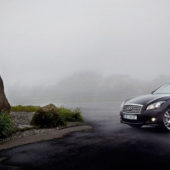Today, the Country Brands Index 2008 was revealed, four days before the official announcement, as was reported by Nation Branding on this post (The Country Brands index 2008, next week). This edition of the Country Brands Index, which is the fourth of the series, is a comprehensive study of approximately 2,700 international business and leisure travelers from nine countries conducted by FutureBrand, a leading global brand consultancy, in conjunction with public relations firm Weber Shandwick’s Global Travel & Lifestyle Practice. This yearâ??s index includes rankings and trends as well as travel motivations, challenges and opportunities within the worlds of travel, tourism and country branding (visit https://www.countrybrandindex.com for complete results).
This year, Australia earns the coveted spot as the worldâ??s top country brand for the third consecutive year. Rising from its sixth place ranking last year, Canada is recognized second and the United States rounds out the top three country brands in the 2008 study. Other countries making the top 10 include Italy, Switzerland and France. This is the Country Brands Index 2008 top-ten country brands:
- Australia
- Canada
- United States
- Italy
- Switzerland
- France
- New Zealand
- United Kingdom
- Japan
- Sweden
The Country Brands Index examines how countries are branded and ranked according to key criteria, and identifies emerging global trends in the worldâ??s fastest growing economic sector â?? travel and tourism, which accounts for US$5.9 trillion of economic activity worldwide this year and more than 238 million jobs.
Rising Stars
The CBI also identified China, the United Arab Emirates (UAE) and Croatia, respectively, as the top three â??rising starsâ? â?? those likely to become major tourist destinations in the next five years. Also making the list this year are Vietnam, India and Cuba. In addition, this yearâ??s CBI includes an in-depth report of how China fares post- Beijing Olympics.
â??In this our fourth year, it is exciting to see many countries embracing the idea of brand. However, we still feel this is a largely underdeveloped category with most countries continuing to promote and market themselves in ways that are not differentiated. Particularly in the coming years, country brands must improve both their strategic orientation as well as their delivery,â? said Rina Plapler, senior executive director, FutureBrand.
This yearâ??s CBI touches on a variety of topics relevant to travelers and tourism professionals including: intergenerational travel (represented by countries such as the U.S., Canada and Japan), medical tourism, mainstream luxury (represented by countries like Japan and Spain), â??stayâ??cations and a rise in the off-the-beaten-track trips. Other notable trends this year focus on niche travel opportunities and the changing destination landscape.
â??With the current state of the worldâ?? economic turmoil, political unrest and global warmingâ??itâ??s always fascinating to see which countries come out on top in branding themselves, generating global recognition and fueling the travel and tourism industry,â? said René A. Mack, president, Weber Shandwickâ??s Travel & Lifestyle Global Practice.
Dimension-specific country brands rankings
The Country Brands Index 2008 rankings for specific dimensions of the brand ara as follows:
Best Country Brand Ideal for Business:
- United States
- Germany
- United Kingdom
- France
- Italy
Best Country Brand to Extend a Business Trip
- Australia
- New Zealand
- Scotland
- Japan
- Ireland
Best Country Brand for Art & Culture
- Italy
- France
- Egypt
- Japan
- Greece
Best Country Brand for Authenticity
- New Zealand
- Japan
- Thailand
- India
- Egypt
Best Country Brand for Beach
- Maldives
- Tahiti
- Bahamas
- Dominican Republic
- Australia
Best Country Brand for Families
- Canada
- Spain
- Denmark
- Australia
- New Zealand
Best Country Brand for History
- Egypt
- Italy
- France
- Greece
- Israel
Best Country Brand for Resort & Lodging Options
- United Arab Emirates
- United States
- Maldives
- Australia
- Switzerland
Best Country Brand for Natural Beauty
- New Zealand
- Maldives
- Switzerland
- Norway
- Australia
Best Country Brand for Nightlife
- Japan
- Brazil
- Spain
- Thailand
- United States
Best Country Brand for Fine Dining
- Italy
- France
- Japan
- Singapore
- Switzerland
Best Country Brand for Outdoor Activities & Sports
- Australia
- New Zealand
- Canada
- Belize
- Switzerland
Best Country Brand for Rest & Relaxation
- Maldives
- Tahiti
- New Zealand
- Fiji
- Bahamas
Best Country Brand for Safety
- Norway
- Switzerland
- New Zealand
- Sweden
- Denmark
Best Country Brand for Shopping
- United States
- United Arab Emirates
- Singapore
- Thailand
- Japan
Best Country Brand for Value for Money
- Thailand
- India
- Mexico
- Czech Republic
- Poland
Best Country Brand You Would Most Like to Live In
- Australia
- New Zealand
- Canada
- Switzerland
- Scotland
Best Country Brand for Ease of Travel
- Netherlands
- Spain
- Canada
- Switzerland
- Germany
Best Country Brand for Standard of Living
- Sweden
- Norway
- Denmark
- Australia
- Switzerland
Best Country Brand for Political Freedom
- Netherlands
- New Zealand
- Sweden
- Denmark
- Norway
Best Country Brand for Advanced Technology
- Japan
- United States
- United Kingdom
- Sweden
- Germany
Best Country Brand for Quality Products
- Japan
- United States
- Germany
- France
- Italy
Best Country Brand for Most Impressive Last Year
- China
- United Arab Emirates
- Australia
- New Zealand
- Japan
Emerging trends in travel and tourism
The 2008 Country Brand Index also includes a number of emerging trends in travel and tourism that have been detected by the CBI team:
- Changing Landscape â?? Within the industry, there has been a significant shift in the countries that are experiencing real tourism growth. Traditional tourism â??hotspotsâ? are being overshadowed by rising star destinations. In terms of regional performance, Africa, Asia Pacific and the Middle East are experiencing higher growth rates than the average world demand. Chief among the changing landscape, citizens are becoming more outspoken about the brands their countries are aligning with to propel tourism, from branding efforts to logos to key messaging. The desire of many travelers to seek authentic vacation experiences has led to a rise in poverty travel â?? visiting poverty-stricken and/or polluted places and communities that showcase a reality otherwise unseen on an upscale or exotic expedition.
- Specialized Travel on the Rise â?? Rapid growth in formerly niche travel and tourism markets continues to be a trend within the industry, including:
- Rise of Women â?? Women are traveling more frequently without men, and women-only tours and retreats are becoming increasingly popular. Women comprise over half of adventure travelers worldwide.
- Grandchild on Board â?? Affluent retirees in the U.S., Canada and Japan are traveling more and more. Half of vacationing baby boomers are now traveling with their grandchildren, indicating a new segment of multi-generational travel.
- Finite Travel â?? There is a rise in people visiting places and/or species that are seen as endangered or in some form of time-related environmental risk. From polar bear and harp seal excursions to rain forest expeditions, many travelers are making it a priority to visit these places before they are irrevocably altered.
- Spontaneous Travel â?? The biological imperative to escape will never go away, however, high pressured lifestyles and advances in online travel have resulted in consumers taking shorter trips each year, often booked last minute.
- Religious Tourism â?? The concept of religious sites and pilgrimages is again becoming increasingly popular among travelers. For instance, the Vatican launched the worldâ??s first airline for Catholic pilgrims. Specialized religious tours are catering to orthodox believers.
- Luxury Flying Upgrades â?? Responding to need, many airlines have developed greater flight options and service classes to cater to the lucrative luxury travel market. These include First and Business Class only airport terminals, as well as new and improved upper class sections in airplanes introduced by leading carriers such as Singapore Airlines and Emirates Airlines. Additionally, there are a variety of new alternatives to conventional air travel that provide greater flexibility to the luxury traveler. Chief among them is the increased availability of regional jets and air taxis. Airports are upgrading at a faster rate, with technological advances such as Radio Frequency Identity (RFID), smart ID cards and self-check-in playing a greater role in the airport experience. The check-in process is also continuing to evolve, as airlines like Air Canada continue to develop bar code technology to allow passengers to board solely with their cell phones (without a printed e-ticket).
Study Methodology
Finally, a short mention about the Country Brands Index 2008’s methodology:
FutureBrand has developed a three-tiered evaluation system for ranking country brands. This Index incorporates global quantitative research, expert opinions, and references relevant statistics that link brand equity to assets, growth and expansion. The result is a unique evaluation system that provides the basis of our rankings. Almost 2,700 respondents from nine countries including the US, UK, China, Australia, Japan, Brazil, UAE, Germany and Russia participated in a travel survey. Participants were screened to include frequent international travelers (who travel internationally more than once a year) between the ages of 21 and 65, with a balanced split between men and women. Business and leisure travelers were both included. Respondents answered questions about behavior around destination selection; country associations with particular attributes; and overall awareness/familiarity, past visits, intent to visit, and willingness to recommend destinations to others. Survey results were aggregated and weighted in proportion to their regionsâ?? respective volume of travel consumption. This was done in order to minimize potential bias around preferred locations from respondents from regions that may have been over-represented in the sample. Performance on attributes by country was then considered against expert opinions and secondary statistics in order to generate the country rankings.





8 comments
Comments are closed.